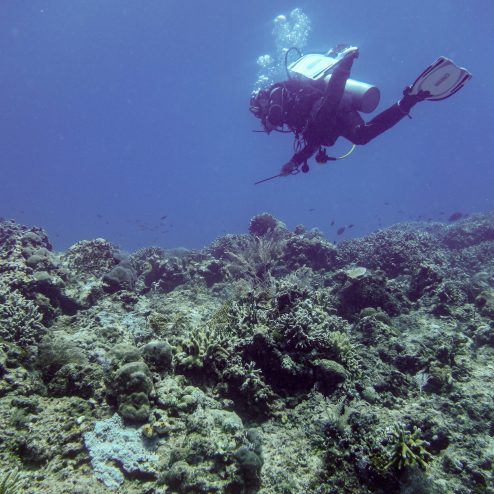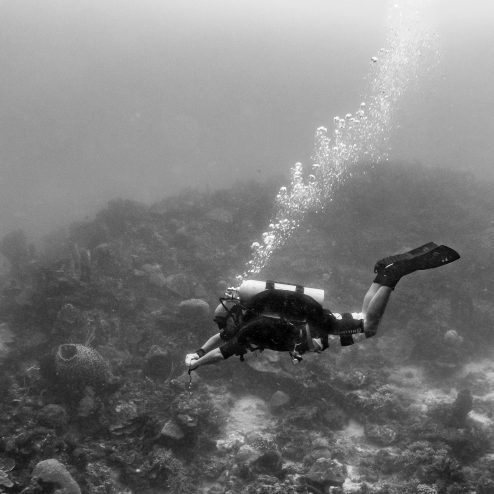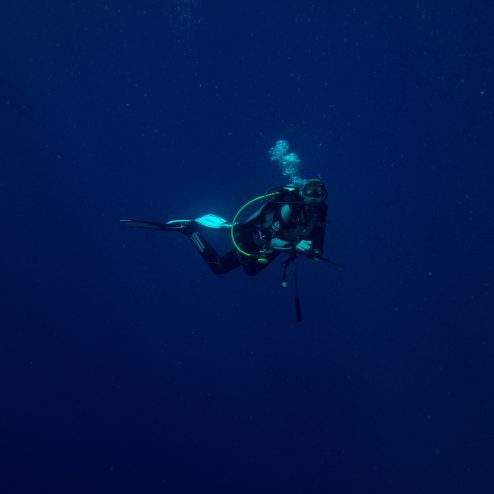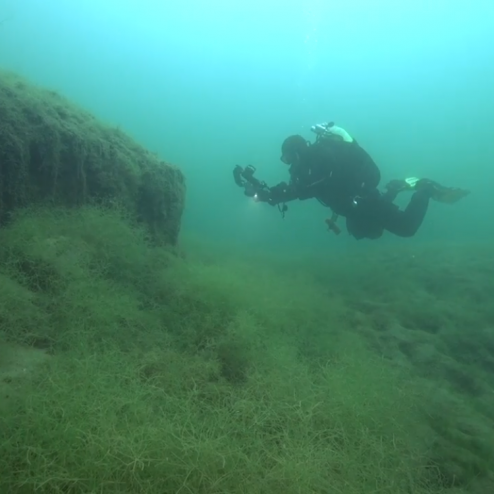8 Tips for relaxed diving
If you follow divers during your excited after-dive discussions, you will always come back to the air consumption or the depth over the short or long term. Such conversations quickly become a bit more heated, especially if it’s only about being better… “I’m out with 100Bar”… “I was 35.8 feet deep” etc. But is diving really about air consumption, depth and duration?
For me scuba diving is a hobby (and a profession) that should be fun, where I can relax and marvel at the fascinating underwater world and take pictures. I’m not going to try to analyse the background of the “air-depth-duration-comparison”, but to give those a few tips that simply want to be more relaxed underwater and have fun while diving.
1. Comparisons
One of the most important tips for relaxed diving that I can give to any diver is: Don’t compare yourself with others and don’t compete in diving! If you take this into heed, the enormous amount of pressure that you make especially as a beginner anyway takes off. Only then do you begin to enjoy scuba diving.
Especially since many of these comparisons also simply do not say anything, in the case of air consumption, for example, many things are related to fitness, physique, experience, diving depth and much more.
2. Equipment
Feel comfortable in your equipment, it should not be too big but not too small. It should just fit. You should also only have the things you really need and do not like a Christmas tree diving. Anything you take with underwater will affect your water position, usually negative. Get to know your equipment (yes, it also makes sense to read a guide or to show it) and understand how to use it.
Only if you know your equipment, it suits you, you know how everything works and you regularly clean it and wait you feel safer and can begin to concentrate on diving.
However, most dive beginners will not have their own equipment and if you dive on holiday with rental equipment The diving equipment will not fit 100%. This can be done with some practice and tip no. 3 to a certain degree. More importantly, let’s explain your rental equipment, especially jacket, computer and instruments. After all, if you have to search underwater for the first time after the quick drain, or if you don’t find the display for the zero times on your computer, it is not only quick to relax but can also be dangerous.
3. Lead and Trim
Often the Bleicheck is ridiculed at check-dive at the beginning of a holiday by “experienced” divers, but this is exactly what helps you to find the right lead and the correct position of the lead in order to enjoy the further dives. Especially if you are not immersed for a long time or if you change from sweet to salt water or the equipment you should always carry out this check and listen to the tips of the guides for a better water situation and heed.
A good trim means that your equipment is configured so that you have an optimal water position and can glide comfortably through the water with a good swimming technique without you constantly feeling you are tilting in any direction. Your upper body should form a horizontal line with your thighs, the arms are stretched forward and the lower legs point upward at 90 degrees. So the fins are your highest point.
A good trim with a horizontal position in the water will make your fin strokes much more effective and you’ll stir up much less sediments. A better water situation also prevents you from accidentally injuring coral hurt or animals with your equipment, and there is often a danger of injuring yourself.
4. Movement
Less is often more, because when you continually hit with your fins or hands you consume unnecessarily energy and air, while diving it is not really about getting somewhere first. You will notice that your air consumption decreases sharply when you start to move less and actively take advantage of your sliding phases, this means you only hit the fins again when you have almost come to a standstill. Hands and equipment are not to be used for propulsion, so learn how to apply the right flipping technique in a variety of situations.
5. Breathing
It is often tried to “control” the respiration or even worse to stop breathing, this is pretty much the most dangerous and can lead to serious injuries to the lungs. If you deliberately try to breathe shallower and less, this will certainly work for one to two minutes, but after that you are totally out of breath and consume twice the amount of money you have previously “saved”. Breathe as naturally as possible and do not think about it, after some time you will notice that your air consumption is reduced without having to actively do something.
6. Know Your limits
Always dive within the limits of your training and experience, so you reduce your stress factor and feel more comfortable during your dive.
7. GoPro and Co.
Of course you want to show friends and families how great it is underwater and what you have seen, however, it is not recommended for diving beginners to take a camera with you. As soon as the buoyancy and respiration are under water and you feel comfortable, you can take a camera with you. Your trim and air consumption will change with camera, however. If the camera is not tared neutral in the water, it will provide for up or down, this can be compensated with the position of the bottle or the lead again. The camera will also increase the air consumption at the beginning, even if it does not feel like an extra effort, one is distracted and breathes more to keep the camera calm.
8. Experience
No diver was perfect from the start, only with exercise and regular dives is the experience and serenity of diving.
Use every possibility to improve your buoyancy under water, for example, the safety stop is always a good chance to train, focus a fixed point (or an experienced diver with very good buoyancy) as a reference and try with the help of your Breathing to control your up and down so you stay in a corridor of a maximum of one metre.
I hope the tips will help you to make your next dives more relaxed. If you need further help or Suggestions, just leave us a comment or write us by email or on Facebook.





























